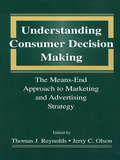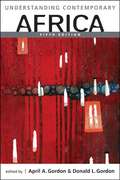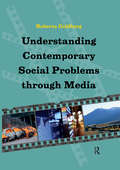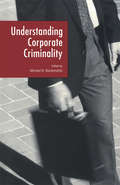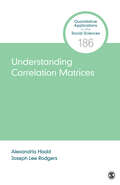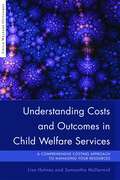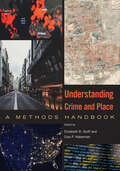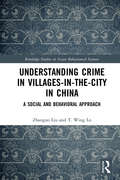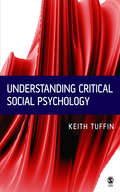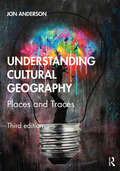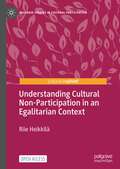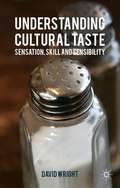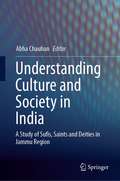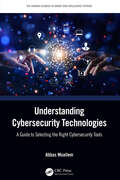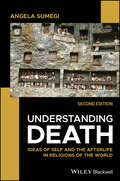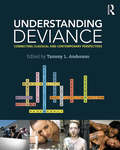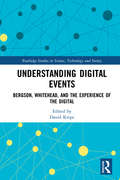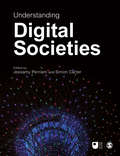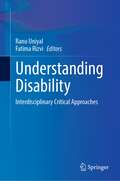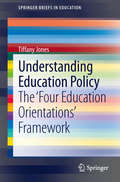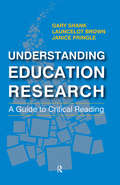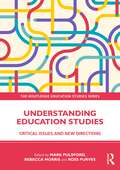- Table View
- List View
Understanding Consumer Decision Making: The Means-end Approach To Marketing and Advertising Strategy
by Thomas J. Reynolds Jerry C. OlsonThe goal of this book is to help business managers and academic researchers understand the means-end perspective and the methods by which it is used, and to demonstrate how to use the means-end approach to develop better marketing and advertising strategy. The authors discuss methodological issues regarding interviewing and coding, present applications of the means-end approach to marketing and advertising problems, and describe the conceptual foundations of the means-end approach. This book is of interest to academic researchers in marketing and related fields, graduate students in business, marketing research professionals, and business managers. It is intended as a reference book containing ideas about the means-end approach and its applications.
Understanding Contemporary Africa (Understanding: Introductions to the States and Regions of the Contemporary World)
by April A. Gordon Donald L. GordonThis new edition of Understanding Contemporary Africa has been thoroughly revised to reflect the many significant events and trends of the past six years-seismic political changes, the impact of the new information technology, the strong presence of China and other foreign powers, and much more. The authors provide current analyses not only of history, politics, and economics, but also geography, environmental concerns, population shifts, and social and cultural issues. Each topic is covered in an accessible style, but with reference to the latest scholarship. Maps, photographs, and a table of basic political data enhance the text.
Understanding Contemporary Social Problems Through Media
by Roberta GoldbergGoldberg uses a multi-media approach to critically examine the most significant and volatile issues of our times: the environmental crisis, upheavals in the developing world, health, terrorism, and technology. The book is unique in its in-depth coverage of these pressing social concerns and its use of extensive media resources through a companion website. An introductory section reviews basic sociological concepts and theories, including the sociological imagination and class, gender, and race stratification all of which are revisited in each chapter. The book helps students appreciate the magnitude of the problems of the twenty-first century as they develop the intellectual tools to understand them sociologically and personally.Features of the text: "
Understanding Corporate Criminality (Current Issues in Criminal Justice #Vol. 3)
by Michael B. BlankenshipFirst Published in 1995. Routledge is an imprint of Taylor & Francis, an informa company.
Understanding Correlation Matrices (Quantitative Applications in the Social Sciences)
by Joseph Lee Rodgers Alexandria R. HaddCorrelation matrices (along with their unstandardized counterparts, covariance matrices) underlie the majority the statistical methods that researchers use today. A correlation matrix is more than a matrix filled with correlation coefficients. The value of one correlation in the matrix puts constraints on the values of the others, and the multivariate implications of this statement is a major theme of the volume. Alexandria Hadd and Joseph Lee Rodgers cover many features of correlations matrices including statistical hypothesis tests, their role in factor analysis and structural equation modeling, and graphical approaches. They illustrate the discussion with a wide range of lively examples including correlations between intelligence measured at different ages through adolescence; correlations between country characteristics such as public health expenditures, health life expectancy, and adult mortality; correlations between well-being and state-level vital statistics; correlations between the racial composition of cities and professional sports teams; and correlations between childbearing intentions and childbearing outcomes over the reproductive life course. This volume may be used effectively across a number of disciplines in both undergraduate and graduate statistics classrooms, and also in the research laboratory.
Understanding Correlation Matrices (Quantitative Applications in the Social Sciences)
by Joseph Lee Rodgers Alexandria R. HaddCorrelation matrices (along with their unstandardized counterparts, covariance matrices) underlie the majority the statistical methods that researchers use today. A correlation matrix is more than a matrix filled with correlation coefficients. The value of one correlation in the matrix puts constraints on the values of the others, and the multivariate implications of this statement is a major theme of the volume. Alexandria Hadd and Joseph Lee Rodgers cover many features of correlations matrices including statistical hypothesis tests, their role in factor analysis and structural equation modeling, and graphical approaches. They illustrate the discussion with a wide range of lively examples including correlations between intelligence measured at different ages through adolescence; correlations between country characteristics such as public health expenditures, health life expectancy, and adult mortality; correlations between well-being and state-level vital statistics; correlations between the racial composition of cities and professional sports teams; and correlations between childbearing intentions and childbearing outcomes over the reproductive life course. This volume may be used effectively across a number of disciplines in both undergraduate and graduate statistics classrooms, and also in the research laboratory.
Understanding Crime and Place: A Methods Handbook
by Elizabeth R. Groff and Cory P. HabermanPlace has become both a major field of criminological study as well as an important area for policy development. Capturing state of the art crime and place research methods and analysis, Understanding Crime and Place is a comprehensive Handbook focused on the specific skills researchers need. The editors and contributors are scholars who have been fundamental in introducing or developing a particular method for crime and place research. Understanding Crime and Place is organized around the scientific process, introducing major crime and place theories and concepts, discussions of data and data collection, core spatial data concepts, as well as statistical and computational techniques for analyzing spatial data and place-based evaluation. The lessons in the book are supplemented by additional instructions, examples, problems, and datasets available for download. Conducting place-based research is an emerging field that requires a wide range of cutting-edge methods and analysis techniques that are only beginning to be widely taught in criminology. Understanding Crime and Place bridges that gap, formalizes the discipline, and promotes an even greater use of place-based research. Contributors: Martin A. Andresen, Matthew P J Ashby, Eric Beauregard, Wim Bernasco, Daniel Birks, Hervé Borrion, Kate Bowers, Anthony A. Braga, Tom Brenneman, David Buil-Gil, Meagan Cahill, Stefano Caneppele, Julien Chopin, Jeffrey E. Clutter, Toby Davies, Hashem Dehghanniri, Jillian Shafer Desmond, Beidi Dong, John E. Eck, Miriam Esteve, Timothy C. Hart, Georgia Hassall, David N. Hatten, Julie Hibdon, James Hunter, Shane D. Johnson, Samuel Langton, YongJei Lee, Ned Levine, Brian Lockwood, Dominique Lord, Nick Malleson, Dennis Mares, David Mazeika, Lorraine Mazerolle, Asier Moneva, Andrew Newton, Bradley J. O’Guinn, Ajima Olaghere, Graham C. Ousey, Ken Pease, Eric L. Piza, Jerry Ratcliffe, Caterina G. Roman, Stijn Ruiter, Reka Solymosi, Evan T. Sorg, Wouter Steenbeek, Hannah Steinman, Ralph B. Taylor, Marie Skubak Tillyer, Lisa Tompson, Brandon Turchan, David Weisburd, Brandon C. Welsh, Clair White, Douglas J. Wiebe, Pamela Wilcox, David B. Wilson, Alese Wooditch, Kathryn Wuschke, Sue-Ming Yang, and the editors.
Understanding Crime in Villages-in-the-City in China: A Social and Behavioral Approach (Routledge Studies in Asian Behavioural Sciences)
by T. Wing Lo Zhanguo LiuRapid urbanization of economic zones in China has resulted in a special social phenomenon: "villages-in-the-city." Underdeveloped villages are absorbed during the expansion of urban areas, while retaining their rustic characteristics. Due to the rural characteristics of these areas, social security is much lower compared with the urbanized city. This book uses Tang Village, a remote area in the Shenzhen Special Economic Zone, as an example to establish a comprehensive analytical framework by integrating existing crime theories in analyzing villages-in-the-city. The analysis covers the community, individual, and macro levels to detail the diverse social and behavioral factors causing crime at multiple levels. First, a brief history of the urbanization process of Tang Village is provided to establish how urban planning contributed to the issues in the village today. The authors go on to explain how socially disorganized communities dictate the crime hotspots and the common types of crime. The book examines other risk factors that may contribute to the level of crime such as weak social controls, building density, and floating populations of poor working-class migrants. The routine activities of victims, offenders, and guardians are examined. The book concludes with the current trends in the social structure within the villages-in-the-city and their expected outcome after urbanization.
Understanding Critical Social Psychology
by Keith Tuffin`This is a thoughtful, honest and accessible text which I would certainly recommend to students. The chapter ordering is excellent and should take the student through a logical progression from the more established to the more contemporary approaches in social psychology′ - Ian Hodges, Westminster University `It is written in a beautifully clear, engaging and conversational style which will make the book accessible and appealing to those encountering critical ideas for the first time.... Students will find the book both interesting and easy to read, and their lecturers will find it a valuable teaching resource. I will certainly be recommending it to my second and third year undergraduates′ - Viv Burr, University of Huddersfield Understanding Critical Social Psychology is an exciting new textbook providing a comprehensive and reader-friendly approach to the theories and methods surrounding Critical Social Psychology. For students taking a course in Critical Social Psychology, this book combines a critical examination of the traditional philosophies, practices and topics with an emphasis on introducing innovative and contemporary developments in social psychological research. In this way, Tuffin integrates newer insights with established modes of thinking. Key Features of this book include: " Student-friendly structure - contains numerous features suitable for undergraduate course use such as section summaries, further reading and a tutorial which answers students′ questions about critical social psychology. " Broad framework - Positions newer insights in relation to the historical, theoretical and ideological roots of social psychology. Ideal for students taking a Critical Social Psychology module having already studied a mainstream course. " Applied focus - Understanding Critical Social Psychology tackles key themes in the discipline i.e. prejudice, politics, identity and emotions from critical perspectives. Written in a clear and accessible style, with illustrative data, detailed chapter summaries and key readings at the end of each section, it will be welcomed by undergraduates seeking to develop their understanding of critical social psychology.
Understanding Cultural Geography: Places and Traces
by Jon AndersonThis book outlines how the theoretical ideas, empirical foci, and methodological techniques of cultural geography make sense of the ‘culture wars’ that define our time. It is on the battleground of culture that our opportunities, rights, and futures are determined and Understanding Cultural Geography showcases how this discipline can be used to understand these battles and how we can engage in them. Through doing so, the book not only introduces the reader to the rich and complex history of cultural geography, but also the key terms on which the discipline is built. From these insights, the text approaches place as an ‘ongoing composition of traces’, highlighting the dynamic and ever-changing nature of the world around us, and what our role can be in transforming it for the better. The third edition has been fully revised and updated to incorporate recent literature and reflect the changing cultural context of its time. Retaining its exciting and innovative structure, the third edition will expand its focus into new areas, including updated chapters on ethnicity and race, and new chapters on gender and the body. This new edition captures not only recent changes in the cultural world, but also the discipline itself, offering the most up-to-date text to understand and engage with the cultural battlegrounds which constitute our lives. Understanding Cultural Geography is the ideal text for students being introduced to the discipline through either undergraduate or postgraduate degree courses. The third edition is an important update to a highly successful text that incorporates a vast foundation of knowledge; it is an invaluable book for lecturers and students.
Understanding Cultural Non-Participation in an Egalitarian Context (Palgrave Studies in Cultural Participation)
by Riie HeikkiläThis book uses a rich data set, from individuals whose background profiles statistically predict strong cultural non-participation, to explore the most salient lifestyles and symbolic boundaries drawn in these potentially disengaged groups.The book departs from a theoretical framework in which cultural practices and cultural participation in their most visible and tangible form are seen as manifestations of cultural capital and power, to show empirically that people and groups dubbed passive in many policy documents and scholarly research are actually relatively active, both in terms of traditional cultural participation and different kinds of social and anthropological understandings of participation. This is an open access book.
Understanding Cultural Taste
by David WrightUnderstanding Cultural Taste updates and critiques established theoretical and empirical accounts of cultural taste. It considers the roles of the cultural industries and cultural policies in shaping tastes and the significance of the technologies through which cultural goods are produced and circulated. Taking a historical and theoretical perspective which complicates an understanding of taste as a matter of personal preference or a crude weapon in social struggles, the book argues that taste remains a key concept for the sociology of culture, media and cultural studies, cultural policy studies and their applied sub-disciplines. Such disciplines have come to appreciate the relation between taste and individual or group identities but have been less attentive to other social and political dimensions of this important component of cultural life.
Understanding Culture and Society in India: A Study of Sufis, Saints and Deities in Jammu Region
by Abha ChauhanThis book is an in-depth account of people’s cultural and religious life in the Jammu region of Jammu and Kashmir, India. It brings out the significance of Sufi and deity shrines as alternative places of worship that give meaning and purpose to people’s lives. It includes sites and practices commonly associated with Islam/Sufism and Hinduism as spaces of shared culture. Most of the existing literature of Jammu and Kashmir is on Kashmir focusing mostly on topics such as politics, state, identity, conflict or violence. This book proposes to go beyond these works by delimiting the focus and area of the study to culture, society and religion. It explores the sites of religious pluralism and tolerance in the violence-ridden territory of Jammu and Kashmir. The chapters are mainly based on ethnographic data collected through qualitative methods like observation – participant and non-participant, case studies, in-depth interviews and oral history. The book is of interest to researchers, both faculty and graduate students, in the areas of sociology of religion, social anthropology, religious studies, cultural studies, Sufism, shrines and deity worship in South Asia.
Understanding Cybersecurity Technologies: A Guide to Selecting the Right Cybersecurity Tools (The Human Element in Smart and Intelligent Systems)
by Abbas MoallemCyberattacks on enterprises, government institutions, and individuals are exponentially growing. At the same time, the number of companies, both small and large, offering all types of solutions has been increasing too. Since companies rely on technological solutions to protect themselves against cyberattacks, understanding and selecting the right solutions among those offered presents a significant challenge for professionals, company executives, and newcomers to the cybersecurity field.FEATURES Presents descriptions for each type of cybersecurity technology and their specifications Explains applications, usages, and offers case studies to enhance comprehension Offers an easy-to-understand classification of existing cybersecurity technologies Provides an understanding of the technologies without getting lost in technical details Focuses on existing technologies used in different solutions, without focusing on the companies that offer these technologies This book is intended to help all professionals new to cybersecurity, students, and experts to learn or educate their audiences on the foundations of the available solutions.
Understanding Death: An Introduction to Ideas of Self and the Afterlife in World Religions
by Angela SumegiA comprehensive survey of how religions understand death, dying, and the afterlife, drawing on examples from Christian, Jewish, Hindu, Buddhist, and Shamanic perspectives. Considers shared and differing views of death across the world’s major religions, including on the nature of death itself, the reasons for it, the identity of those who die, religious rituals, and on how the living should respond to death Places emphasis on the varying concepts of the ‘self’ or soul Uses a thematic structure to facilitate a broader comparative understanding Written in an accessible style to appeal to an undergraduate audience, it fills major gap in current textbook literature
Understanding Death: Ideas of Self and the Afterlife in Religions of the World
by Angela SumegiWhat is death? How can we respond to death? Why must we die? Where do we go from here? Do we go anywhere? Understanding Death offers a thorough introduction to the views and practices of various religions regarding death and life after death. Drawing on examples from Christian, Jewish, Hindu, Buddhist, and Shamanic traditions, this student-oriented textbook explores how different conceptions of the “self” or soul inform the way humans interpret life and assign meaning to the phenomenon of death. Incorporating contributions from members of each faith, Understanding Death provides readers with a comparative overview of how death is expressed and constructed in religious texts and canonical interpretations. Accessible chapters discuss how major religions address the nature of death itself while illustrating how history, philosophy, and ritual reflect what is important in understanding the meaning of death in that religion. Now in its second edition, Understanding Death is revised and updated throughout, featuring three entirely new chapters on Sikhism, Jainism, as well as changing attitudes and new technologies related to death and dying in the twenty-first century. Understanding Death: Ideas of Self and the Afterlife in Religions of the World, Second Edition, is an ideal textbook for undergraduate students and lecturers in Religious Studies programs, and an excellent resource for non-specialist readers interested in the subject.
Understanding Deviance: Connecting Classical and Contemporary Perspectives (Sociology Re-Wired)
by Tammy L. AndersonIn this collection of 48 reprinted and completely original articles, Tammy Anderson gives her fellow instructors of undergraduate deviance a refreshing way to energize and revitalize their courses. [36 are reprints; 12 are original to this text/anthology] First, in 12 separate sections, she presents a wide range of deviant behaviors, traits, and conditions including: underage drinking and drunk driving, doping in elite sports, gang behavior, community crime, juvenile delinquency, hate crime, prison violence and transgendered prisoners, mental illness, drug-using women and domestic violence, obesity, tattooing, sexual fetishes, prostitution, drug epidemics, viral pandemics, crime control strategies and racial inequality, gay neighborhoods, HIV and bugchasers, and (lastly) youth, multicultural identity and music scenes. Second, her pairing of "classic" and "contemporary" viewpoints about deviance and social control not only "connects" important literatures of the past to today’s (student) readers, her "connections framework" also helps all of us see social life and social processes more clearly when alternative meanings are accorded to similar forms of deviant behavior. We also learn how to appreciate and interact with those who see things differently from ourselves. This may better equip us to reach common goals in an increasingly diverse and ever-changing world. Third, a major teaching goal of Anderson’s anthology is to sharpen students’ critical thinking skills by forcing them to look at how a deviant behavior, trait or condition, can be viewed from opposing or alternative perspectives. By learning to see deviance from multiple perspectives, students will better understand their own and other’s behavior and experiences and be able to anticipate future trends. Balancing multiple perspectives may also assist students in their practical work in social service, criminal justice and other agencies and institutions that deal with populations considered "deviant" in one way or another.
Understanding Digital Events: Bergson, Whitehead, and the Experience of the Digital (Routledge Studies in Science, Technology and Society)
by David KrepsThis book introduces an events-based approach to understanding digital experience. Focusing on the event-ontologies of Bergson and Whitehead’s process metaphysics, it explores subjective experience and objective reality as unified ‘events’ in the form of concrete slabs of existence. Such slabs are temporally defined by a term or period, in which all physical-chemical processes and personal subjective experience are included. Bringing together insights from a range of different specialisms, it urges us to consider a science of nature that includes both physical and non-physical realities and, from this ontological position, draws on philosophy, media, and user experience practice to provide a new account of the technological or virtual world of today. An examination of the manner in which process philosophy may be applied to contemporary digital experience, this volume will appeal to scholars of philosophy, science and technology studies and information systems.
Understanding Digital Societies (Published in association with The Open University)
by Simon Carter Jessamy PerriamUnderstanding Digital Societies provides a framework for understanding our changing, technologically shaped society and how sociology can help us make sense of it. You will be introduced to core sociological ideas and texts along with exciting global examples that shed light on how we can use sociology to understand the world around us. This innovative, new textbook: Provides unique insights into using theory to help explain the prevalence of digital objects in everyday interactions. Explores crucial relationships between humans, machines and emerging AI technologies. Discusses thought-provoking contemporary issues such as the uses and abuses of technologies in local and global communities. Understanding Digital Societies is a must-read for students of digital sociology, sociology of media, digital media and society, and other related fields.
Understanding Digital Societies (Published in association with The Open University)
by Simon Carter Jessamy PerriamUnderstanding Digital Societies provides a framework for understanding our changing, technologically shaped society and how sociology can help us make sense of it. You will be introduced to core sociological ideas and texts along with exciting global examples that shed light on how we can use sociology to understand the world around us. This innovative, new textbook: Provides unique insights into using theory to help explain the prevalence of digital objects in everyday interactions. Explores crucial relationships between humans, machines and emerging AI technologies. Discusses thought-provoking contemporary issues such as the uses and abuses of technologies in local and global communities. Understanding Digital Societies is a must-read for students of digital sociology, sociology of media, digital media and society, and other related fields.
Understanding Disability: Interdisciplinary Critical Approaches
by Ranu Uniyal Fatima RizviThis edited volume brings together contributions on disability studies organized around two themes: literary and sociological aspects. The contributors include academics, disability activists, and researchers from within and outside the Indian periphery. While the book strengthens the disability discourse and contributes to building academic scholarship on this subject, it also promotes disability activism by giving space to both direct practitioners and persons with disabilities. The chapters discuss various analytical and literary aspects of the marginalization experienced by the disabled community and bring forth new and elaborate perspectives. It draws connections across multiple identities and includes personal narratives across nations, cultures and societies. It is an excellent research resource on disability studies in India for scholars and students in the area of humanities, education, law, sociology and social work, while at the same time also addressing the global context.
Understanding Education Policy
by Tiffany JonesAnalysis of education policy often follows a particular orientation, such as conservative or neo-liberal. Yet, readers are often left to wonder the true meaning and conceptual framing behind these orientations. Without this knowledge, the policy analysis lacks true rigor, its value is diminished as the results may prove difficult to reproduce. Understanding Education Policy provides an overarching framework of four key orientations that lie beneath much policy analysis, yet are rarely used with accuracy: conservative, liberal, critical and post-modern. It details each orientation's application to policy making, implementation and overall impact. The book also argues the value of analysing a policy's orientation to improve the clarity of its analysis and allow broader trends across the education policy field to emerge. The book offers practical examples, key vocabulary and reflection activities which give equitable, yet critical consideration to all education orientations. This allows readers to see the benefits and disadvantages of each perspective and discover their own biases. This introduction to education policy analysis offers theoretically broad, highly practical coverage. It is adaptable to many kinds of policy analysis areas and will appeal to a wide range of readers with an interest in education policy, from students conducting specific research to policy makers looking for a deeper way to re-think their work.
Understanding Education Research: A Guide to Critical Reading
by Launcelot Brown Gary Shank Janice Pringle"Understanding Education Research" is designed to help students learn to read educational research articles carefully, systematically, and critically. Students learn to categorize titles, decode abstracts, find research questions, characterize research arguments, break down methods and procedures, explore references, apply analysis strategies, and interpret findings. The book allows them to easily develop the skills they need to be research literate. It offers simple guidelines for qualitative, quantitative, and statistical approaches that help students master the basics behind these often complex and confusing methodologies. The book is accessible for future researchers or for students who simply need to understand research clearly. It is written in a clear and engaging style, with ample concrete examples of each stage, offering exercises for student practice.
Understanding Education Studies: Critical Issues and New Directions (The Routledge Education Studies Series)
by Mark PulsfordThis book explores undergraduate education programmes in a new way. Written by those at the forefront of teaching and learning, it encourages students to delve beneath the surface of their degree subject and reveals important insights about the how, why and where next for education studies. With contributions from course leaders, tutors, current students and recent graduates, this book offers insights from nearly 60 authors based in 20 different institutions from five different countries. The chapters offer opportunities for readers to consider their own learning experiences in a wider context, enhance their understanding of the degree course and actively shape the education studies community of the future. Each chapter is written in an accessible way, with ‘questions to consider’ throughout and ‘recommended readings’ at the end to advance readers’ thinking and reflections. Chapters cover topics such as: Education Studies’ development as a degree subject Its evolving identity, values and purposes Teaching and assessment approaches in undergraduate education programmes How the subject develops students’ professional aptitudes and transferable skills Possibilities for advancing inclusion, equity and justice in education at degree level These ‘behind the scenes’ factors are brought to the fore through case studies and examples of how lecturers and students make sense of their teaching and learning. With its unique approach to examining these issues, this book is essential for students of Education Studies at undergraduate level while also being relevant for staff and postgraduate students in education.
